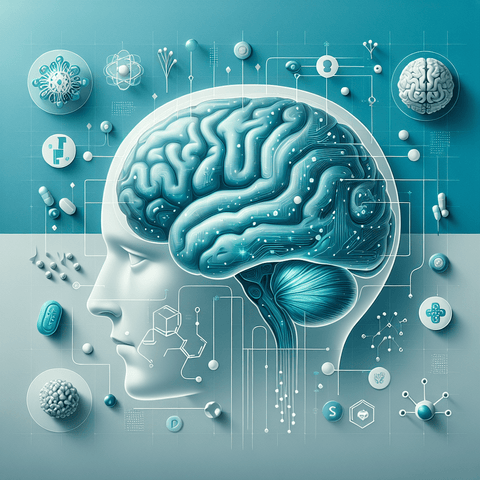Introduction
In an era where mental agility and cognitive resilience are increasingly vital, the pursuit of optimal brain health has taken center stage. Whether we're juggling busy work schedules, pursuing academic excellence, or simply aiming for everyday mental clarity, maintaining and enhancing cognitive function is a priority for many. Nutrition plays a pivotal role in supporting brain health, and among the array of vitamins and minerals, Vitamin B12 stands out as a powerful contributor to cognitive vitality. Its importance extends beyond basic nutritional needs; Vitamin B12 influences neurological processes, supports nerve health, and can significantly impact memory, focus, and overall mental clarity.
This comprehensive guide delves into how Vitamin B12 can unlock your brain's potential. From understanding its basic functions to exploring scientific studies showcasing its benefits, you'll discover how supplementing with B12 can be a strategic step toward enhancing mental performance. Whether you're concerned about age-related cognitive decline, seeking sharper focus, or simply want to boost your mental energy, understanding the science behind Vitamin B12’s role in brain health can empower you to make informed decisions for your cognitive future.
Vitamin B12 and Nutritional Supplements: Essential for Brain Function
Vitamin B12, also known as cobalamin, is a water-soluble vitamin crucial for numerous physiological processes, especially those related to the nervous system. It is naturally found in animal-based foods such as meat, eggs, dairy, and shellfish. For vegans or individuals with certain malabsorption issues, obtaining sufficient B12 from diet alone can be challenging, necessitating supplementation. Topvitamine offers a range of options, including B12 supplements, helping individuals meet their daily needs and support optimal health.
Why is Vitamin B12 considered a cornerstone in mental health? The answer lies in its fundamental role in DNA synthesis, red blood cell formation, and, most relevant here, neurological process support. B12 is essential for maintaining the integrity of myelin, the protective sheath surrounding nerve fibers, which is vital for efficient nerve signal transmission. Without adequate B12 levels, neural communication can become impaired, leading to cognitive issues such as memory lapses, difficulty concentrating, and mental fatigue.
Research continually affirms the importance of B12 in supporting neurological health. Several studies demonstrate that supplementing with B12 can improve cognitive function, especially in populations with deficiencies. A deficiency may cause symptoms such as forgetfulness, confusion, and even depression. Addressing these through proper supplementation not only helps prevent severe neurological consequences but also promotes everyday mental clarity and cognitive performance.
Common misconceptions abound; some believe that B12 supplementation can dramatically boost intelligence overnight. However, its benefits are more about maintaining normal cognitive function and preventing decline rather than a sudden enhancement. Scientific evidence supports the idea that optimal B12 levels are essential for any meaningful improvements in mental performance, especially when deficiency is addressed.
Brain Health: How Vitamin B12 Contributes to Optimal Brain Function
The brain is an extraordinarily complex organ requiring constant nourishment and maintenance. Vitamin B12 contributes significantly to the structural integrity of brain tissue. It assists in the synthesis of neurotransmitters—chemical messengers that facilitate communication between neurons—thus directly influencing our ability to learn, remember, and adapt. Adequate B12 levels are associated with healthy neural connectivity, crucial for efficient information processing.
Research further substantiates B12’s role in supporting brain health. A large body of scientific literature points to its involvement in preventing cognitive decline, particularly among the elderly. For example, studies indicate that older adults with sufficient B12 levels perform better on memory and processing speed assessments. Conversely, B12 deficiency has been linked to structural brain changes, including reduced gray matter volume and increased risk of neurodegenerative conditions. These findings underscore the importance of maintaining sufficient B12 levels throughout life to safeguard neural integrity.
Early signs of B12-related brain health decline include memory lapses, difficulty concentrating, confusion, and fatigue. Preventative strategies focus on ensuring adequate intake through diet and supplementation, especially for populations at higher risk of deficiency, such as vegetarians, vegans, and older adults. Regular testing and personalized supplementation plans can significantly mitigate risks, supporting lifelong brain health.
Cognitive Enhancement: Boosting Mental Capacity with B12 Support
The link between B12 and cognitive performance is well documented in scientific studies. B12 influences the synthesis of key neurotransmitters—such as serotonin, dopamine, and norepinephrine—that regulate mood, focus, and mental alertness. When B12 levels are optimal, nerve signaling is efficient, leading to improved cognitive abilities, enhanced memory retention, and faster problem-solving skills.
Numerous clinical trials reveal that supplementation with B12 can produce measurable improvements in cognitive functions, especially among individuals with existing deficiencies. In one notable study, elderly participants supplementing with B12 experienced better memory recall and sharper mental processing after several months. These effects are most pronounced when deficiency or suboptimal B12 levels are corrected.
Practical advice regarding dosage and duration depends on individual needs but generally involves daily intake ranges of 500 mcg to 2000 mcg for noticeable cognitive benefits. Consulting with healthcare providers can help tailor supplementation plans, particularly for those with absorption issues or diagnosed deficiencies.
To maximize cognitive gains, combining B12 supplementation with other brain-boosting nutrients—such as Omega-3 fatty acids, available at https://www.topvitamine.com/collections/dha-epa-omega-3-supplements—can produce synergistic effects. A holistic approach to nutrition fosters more comprehensive cognitive enhancement.
Mental Clarity: Clearing the Fog with Adequate Vitamin B12 Intake
Mental fog, exhaustion, and an inability to focus are common complaints, often stemming from B12 deficiency. When B12 levels are inadequate, neural communication becomes sluggish, leading to symptoms like forgetfulness, reduced concentration, and general mental sluggishness. Restoring B12 levels can thus be a game-changer in regaining mental clarity.
Supplementing with B12 has been shown to reverse some of these symptoms, restoring energy and mental sharpness. Individuals experiencing persistent fatigue or concentration issues should consider testing their B12 levels. Incorporating B12-rich foods or supplements into daily routines often results in improved alertness and reduced mental fatigue.
Effective lifestyle factors that boost B12 absorption include eating a balanced diet rich in animal proteins, avoiding excessive alcohol consumption, managing gastrointestinal health, and considering sublingual or injectable B12 forms for those with absorption issues. For daily supplementation, choosing potent B12 formulations can support sustained mental clarity—such as methylcobalamin or cyanocobalamin, available at https://www.topvitamine.com/collections/vitamin-b-benefits-safety.
In practice, integrating B12 supplements into your morning routine, paired with other brain-support nutrients, can help maintain consistent mental acuity—keeping you focused, sharp, and ready to tackle complex tasks effectively.
Neurological Support: Protecting and Supporting Nerve Function with B12
Beyond cognitive performance, Vitamin B12 plays a crucial role in maintaining nerve health and supporting neurological regeneration. It assists in the formation of the myelin sheath—a protective covering around nerves that ensures efficient nerve signal transmission. This function is vital for nerve repair, development, and preventing neurodegenerative diseases.
Preventing neuropathies and supporting nerve regeneration are key benefits of adequate B12 intake, especially for individuals with conditions like peripheral neuropathy or at risk of neurodegeneration. Symptoms indicating neurological support needs include tingling, numbness, muscle weakness, and coordination problems. Addressing these early with B12 supplementation can significantly improve quality of life.
To maximize nerve support, combining B12 with other supportive nutrients such as magnesium for muscle and nerve health (see https://www.topvitamine.com/collections/magnesium-benefits-energy-muscle-bone-support) can be effective. Ensuring good gut health and proper absorption methods further enhance B12 efficacy in neurological protection.
Regular screening and personalized plans are essential for those with neurological symptoms or risk factors. Supplementing with pharmaceutical-grade B12 forms, along with lifestyle interventions, can help preserve neural function well into old age, promoting a resilient nervous system.
B12 Deficiency: Recognizing and Addressing a Common Brain Health Threat
Despite its importance, B12 deficiency is surprisingly widespread, notably among older adults, vegetarians, vegans, and individuals with gastrointestinal disorders. The deficiency can develop gradually, often with subtle symptoms that may be mistaken for general fatigue or stress but have profound implications for brain health.
Symptoms of deficiency include forgetfulness, difficulty concentrating, mood disturbances, numbness, and balance issues, all of which point to potential neurological impairment. The risk factors demand routine screening and early intervention. Testing B12 blood levels can confirm deficiency, allowing professionals to recommend appropriate supplementation strategies.
Prevention is preferable; incorporating B12-rich foods or supplements into daily diets can help maintain optimal brain health. For those diagnosed with deficiency, high-dose B12 therapy—via oral, sublingual, or injectable routes—can quickly restore levels and prevent long-term neural damage.
To avoid deficiency, especially in at-risk populations, regular monitoring, personalized supplements, and education on dietary sources are essential steps. For instance, fortified foods and B12 supplements tailored specifically for brain health support are ideal options accessible on Topvitamine’s website.
Conclusion
In conclusion, Vitamin B12 is a fundamental nutrient with far-reaching effects on brain health and cognitive function. From supporting neural tissue, enhancing communication between neurons, and safeguarding against neurodegeneration, to improving mental clarity and focus—B12 plays a vital role in unlocking and maintaining your full cognitive potential. Ensuring adequate B12 levels through diet and tailored supplementation can be a proactive approach to a sharper mind and healthier brain throughout life.
By understanding its functions and benefits, you’re empowered to take control of your cognitive health. Incorporating B12 supplements from Topvitamine and combining them with other brain-boosting nutrients can help you achieve mental clarity, improved memory, and sustained mental energy. Always consult healthcare providers to develop a personalized plan suited for your specific needs and ensure you're supporting your brain effectively for years to come.
Q&A Section
Q: How does Vitamin B12 specifically improve cognitive performance?
A: B12 supports neurotransmitter synthesis, nerve signal transmission, and myelin integrity, which collectively improve memory, focus, and overall mental clarity. Clinical evidence shows that correcting B12 deficiencies enables better cognitive function.
Q: What are the common signs of B12 deficiency affecting the brain?
A: Symptoms include forgetfulness, confusion, difficulty concentrating, fatigue, and mental fog. These signs often precede more severe neurological issues if untreated.
Q: How much B12 should I take for cognitive benefits?
A: Typical supplementation ranges from 500 mcg to 2000 mcg daily, but individual needs vary. Consult your healthcare provider for personalized advice, especially if absorption issues are suspected.
Q: Can B12 supplementation prevent neurological diseases?
A: Adequate B12 levels are associated with reduced risk factors for neurodegeneration, though it's part of a broader approach that includes other nutrients and lifestyle factors. Regular testing and maintenance are vital.
Q: Where can I find quality B12 supplements?
A: Topvitamine offers high-quality B12 products, including methylcobalamin and cyanocobalamin, designed to support brain and nerve health. You can explore options here: Vitamin B Supplements.
Important Keywords
- Vitamin B12
- Cognitive function
- Brain health
- Mental clarity
- Neurological support
- B12 deficiency
- Memory improvement
- Neuroprotection
- Brain supplements
- Neurotransmitter synthesis



